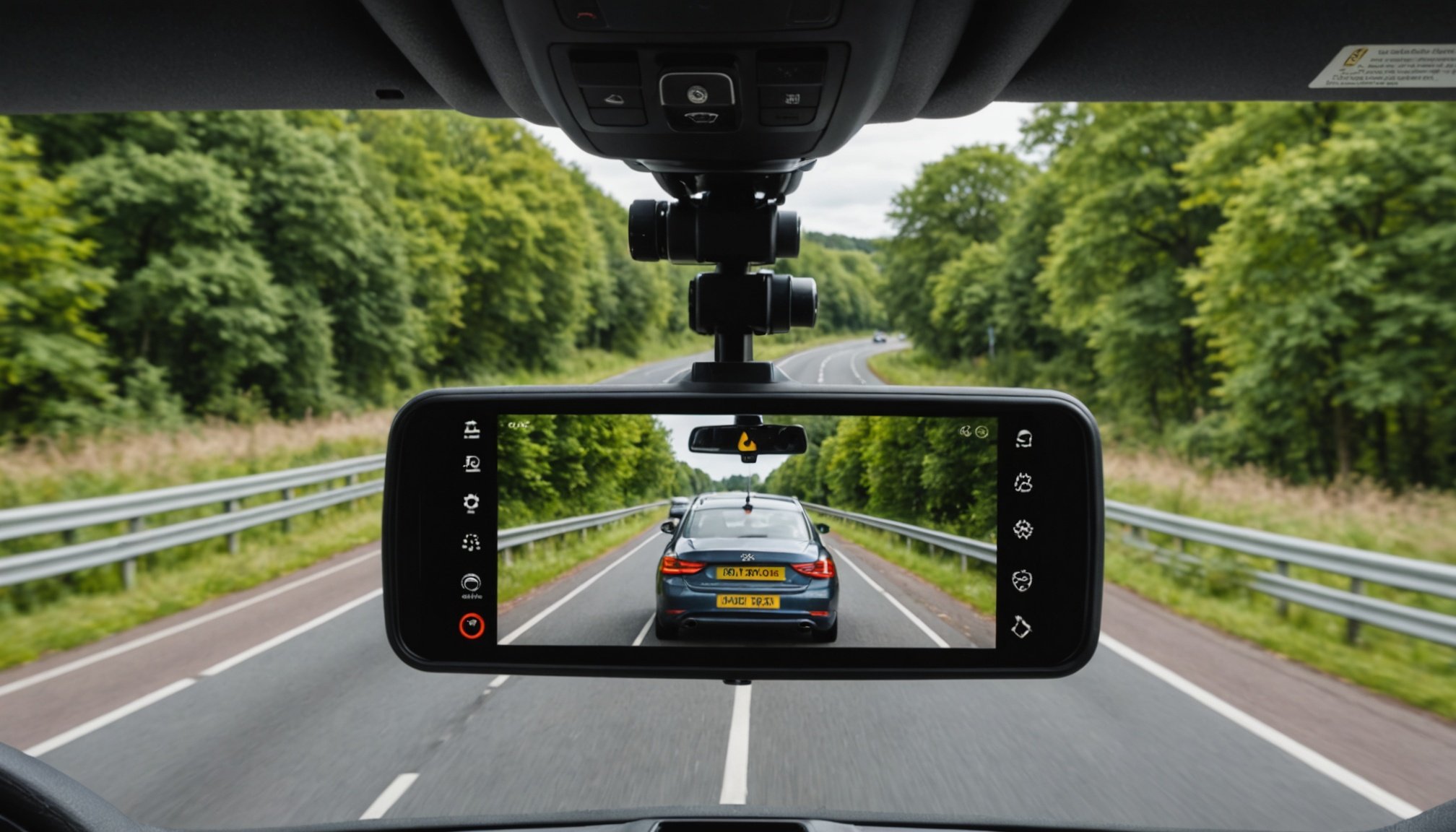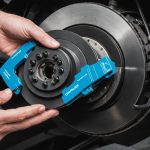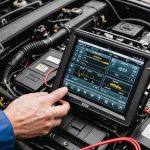Unlocking UK Road Laws: How Dashboard Cameras Enhance Driving Safety
In the ever-evolving landscape of road safety, dashboard cameras, or dash cams, have emerged as a crucial tool in enhancing driving safety and aiding in the enforcement of UK road laws. This article delves into the world of dash cams, exploring their benefits, how they work, and their impact on road safety.
The Rise of Dashboard Cameras
Dashboard cameras have become increasingly popular among UK drivers, and for good reason. These small, unobtrusive devices can be mounted on the windshield of a vehicle and record footage of the road ahead in real time. Here are some key reasons why dash cams are gaining traction:
In the same genre : Step-by-Step Guide to Navigating the Legal Import of Vintage Motorcycles into the UK
- Evidence in Insurance Claims: Dash cam footage can be invaluable in the event of an accident, providing clear evidence of what happened. This can significantly speed up insurance claims and help resolve disputes quickly[2].
- Improved Driving Behavior: Knowing that their driving is being recorded can encourage drivers to be more cautious and adhere to road laws. This is particularly beneficial for fleet management, where companies can monitor the driving habits of their employees[2].
- Enhanced Road Safety: By capturing footage of dangerous driving, dash cams can help identify and deter reckless behavior. For instance, the new AI cameras being trialed in Devon and Cornwall are designed to detect impaired drivers, a significant step in reducing the risk of accidents caused by drunk or drugged driving[1][2].
How Dashboard Cameras Work
Dashboard cameras are relatively simple to install and use. Here’s a breakdown of their functionality:
Installation and Basic Use
- Installing Dash Cams: Most dash cams come with a suction mount or adhesive pad that allows you to attach the device to your windshield. They usually connect to the car’s power outlet and start recording automatically when the vehicle is turned on.
- Recording Modes: Dash cams often have multiple recording modes, including continuous recording, parking mode (which records when the car is stationary), and impact detection (which saves footage before and after a collision)[2].
Advanced Features
- GPS and Location Data: Many modern dash cams come with built-in GPS, which can record location data, speed, and even the direction of travel. This can be particularly useful in reconstructing the events leading up to an accident.
- Wi-Fi and Mobile App Connectivity: Some dash cams allow you to connect to them via Wi-Fi or a mobile app, enabling you to view footage, adjust settings, and even download videos directly to your phone[2].
Enhancing Road Safety with AI Cameras
The latest innovation in road safety involves the use of AI-powered cameras to detect and prevent dangerous driving behaviors.
Also to see : 2024 UK Car Market: Key Trends and Innovations to Watch
AI Cameras in Action
- Detecting Impaired Drivers: In a world-first trial, AI cameras are being used in Devon and Cornwall to identify drivers who may be under the influence of alcohol or drugs. These cameras analyze driving behavior patterns and alert nearby police officers in real time, allowing for immediate intervention[1][2].
- Targeting Hotspots: The AI cameras can be strategically relocated to monitor areas known for high instances of drink or drug driving. This targeted approach ensures that police resources are used efficiently to maximize the impact on road safety[1][2].
Practical Insights and Actionable Advice
Here are some practical tips and insights for those considering using dash cams or who are already using them:
Choosing the Right Dash Cam
- Resolution and Field of View: Look for a dash cam with high video resolution (at least 1080p) and a wide field of view to capture as much of the road as possible.
- Memory Card Capacity: Ensure the dash cam has a sufficient memory card capacity or the option to expand it. This is crucial for continuous recording without running out of space.
- Data Protection: Always check the data protection policies of the manufacturer, especially regarding personal data and location data. Opt for brands that emphasize privacy and security[2].
Using Mobile Phones Safely
- Hands-Free Mode: While dash cams are essential, it’s equally important to use mobile phones responsibly. Always use hands-free mode or pull over to a safe location before using your phone.
- Avoiding Distractions: Mobile phone use is a significant contributor to accidents. Avoid using your phone while driving, as it can distract you from the road and increase the risk of an accident[2].
The Impact on Fleet Management
For companies managing a fleet of vehicles, dash cams can be a game-changer.
Monitoring Driving Habits
- Real-Time Feedback: Dash cams provide real-time footage that can be used to monitor and improve driving habits. This can lead to safer driving practices and reduced risk of accidents.
- Training and Education: Footage from dash cams can be used in training sessions to educate drivers about safe driving practices and the consequences of reckless behavior.
Reducing Insurance Costs
- Lower Premiums: Companies that install dash cams in their fleet vehicles may see a reduction in insurance premiums. Insurers often offer discounts for vehicles equipped with dash cams due to the reduced risk of accidents and the ease of resolving claims[2].
Addressing Privacy Concerns
One of the primary concerns with the use of dash cams is privacy. Here’s how these concerns are being addressed:
Data Protection Policies
- Opt-In Contributions: Programs like Google Maps’ use of dashcam data ensure that participation is strictly opt-in. This means that drivers voluntarily contribute their data, and all identifiable details are blurred before processing[3].
- Local Privacy Regulations: Companies operating in the UK adhere to strict local privacy regulations, ensuring that data collection is ethical and focused on improving road safety without compromising personal data[3].
Real-Life Examples and Anecdotes
Here are a few examples that illustrate the impact of dash cams on road safety:
Case Study: Devon and Cornwall AI Camera Trial
- Reducing Impaired Driving: The AI camera trial in Devon and Cornwall has shown promising results in detecting and preventing impaired driving. Superintendent Simon Jenkinson of Devon and Cornwall Police highlighted the importance of this technology in targeting operational resources effectively[1][2].
Personal Experience: A Dash Cam Saves the Day
- Accident Evidence: A driver in the UK was involved in a minor accident, but thanks to his dash cam, he had clear evidence of the other driver’s fault. This footage helped resolve the insurance claim quickly and without dispute.
Dashboard cameras are more than just a gadget; they are a vital tool in enhancing road safety and aiding in the enforcement of UK road laws. With their ability to provide real-time footage, detect dangerous driving behaviors, and offer valuable evidence in insurance claims, dash cams are becoming an essential component of modern driving.
Here is a detailed bullet point list summarizing the key benefits and features of dash cams:
- Evidence in Insurance Claims: Provides clear footage to resolve disputes quickly.
- Improved Driving Behavior: Encourages cautious driving by recording driving habits.
- Enhanced Road Safety: Helps identify and deter reckless behavior.
- GPS and Location Data: Records location, speed, and direction of travel.
- Wi-Fi and Mobile App Connectivity: Allows for remote viewing and downloading of footage.
- Data Protection: Ensures privacy by adhering to local regulations and blurring identifiable details.
- Fleet Management: Monitors and improves driving habits, reducing insurance costs.
- Real-Time Feedback: Provides immediate feedback on driving behavior.
Comparative Table: Features of Popular Dash Cams
| Feature | Basic Dash Cam | Mid-Range Dash Cam | Advanced Dash Cam |
|---|---|---|---|
| Resolution | 720p | 1080p | 4K |
| Field of View | 120° | 150° | 170° |
| GPS | No | Yes | Yes |
| Wi-Fi Connectivity | No | Yes | Yes |
| Mobile App | No | Yes | Yes |
| Parking Mode | No | Yes | Yes |
| Impact Detection | No | Yes | Yes |
| Memory Card Capacity | 32GB | 64GB | 128GB |
| Data Protection | Basic | Advanced | Advanced with encryption |
In conclusion, dashboard cameras are a powerful tool in the quest for safer roads. Whether you are a private driver or part of a fleet, installing a dash cam can significantly enhance your safety and the safety of other road users. As technology continues to evolve, we can expect even more sophisticated features that will further improve road safety and enforcement of UK road laws.
Quotes from Experts
- Geoff Collins, UK General Manager of Acusensus: “Driving while impaired is incredibly dangerous and quite often you only find out that a driver was drunk or under the influence of drugs after a collision has occurred. We’re trying to replicate the policeman’s nose for trouble.”[2]
- Superintendent Simon Jenkinson of Devon and Cornwall Police: “We have an expansive road network of nearly 14,000 miles in Devon and Cornwall, meaning our officers cannot be everywhere. Camera technology helps us to target operational resources in an effective way, where intelligence informs our deployment.”[1][2]
- Paul Barker, Editor at Auto Express: “[The technology] may look like a win for those allocating police budgets, but without more police officers on the road, and real visibility for enforcement, law-abiding drivers will continue to be at the mercy of those irresponsible drivers who endanger others through their own reckless actions.”[1]











